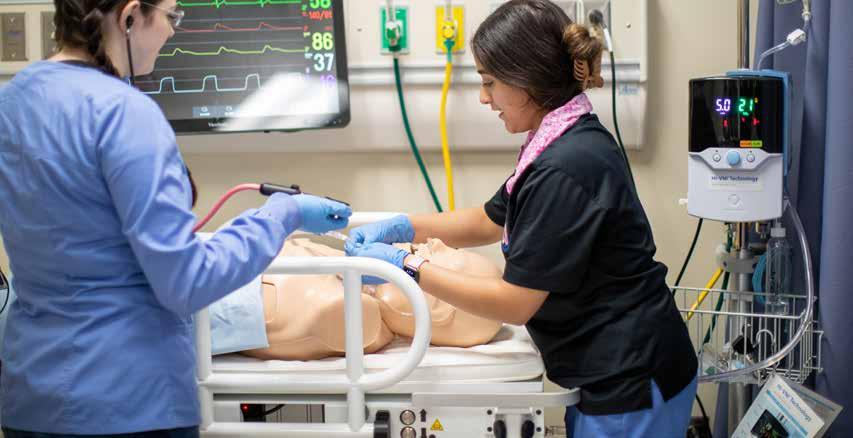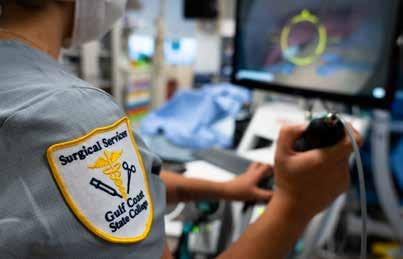
4 minute read
EDUCATION
GCSC Health Sciences and Nursing Division Prepares Students for Real-Life Situations
by: Elizabeth Humphries, Gulf Coast State College
Gulf Coast State College (GCSC) offers 10 degree programs and four workforce certificate programs for individuals interested in Florida’s high-demand industry. Many of GCSC’s health science programs lead to national certification, which ensures graduates’ ability to gain a great career after graduation.
State-of-the-Art Equipment
To prepare for real-life scenarios within the healthcare workforce, GCSC remains cutting-edge with the newest technologies in the classroom. Technologically advanced and innovative learning opportunities are evident in the state-of-the-art George G. Tapper Health Sciences Building at GCSC. Graduates are well prepared as entry-level health care providers having trained on the most advanced equipment being used in medical and dental settings.
Despite the complications and disruptions experienced during the COVID-19 pandemic, a silver lining emerged in the form of federal funding. The CARES Act provided the financial means necessary to assist the College in overcoming the restrictions that complicated the disruption of usual instructional modes of delivery. Some of the newest equipment gained and utilized in the health sciences and nursing programs include virtual dissection tables, calibration dental models, wearable devices to simulate tracheotomy care and
catheterization, video laryngoscope (Glide Scope), spirometers, a pulmonary function machine, a mechanical ventilator, an ultrasound station for carotid/peripheral vascular, abdominal, superficial structure, and pelvic ultrasound exams, as well as web cameras to allow video recordings of student simulation experiences.
Simulation equipment has been an essential part of learning for Gulf Coast State College students. GCSC has been able to revolutionize the simulation experience in many programs with high fidelity simulation manikins this includes the respiratory care manikin that simulates patient care, allowing for comprehensive ventilator management, chest tube insertion, cricothyrotomy and needle decompression. The program also has a fetal ultrasound training phantom allowing students to assess fetal anatomy, size, placental localization and evaluation of amniotic fluid volume.
A Virtual Reality Laparoscopic Training System is also now available for practice with surgical anatomy and instrumentation for our surgical services students.
Coming soon, health sciences and nursing students will be able to experience clinical rotations on the GCSC mobile medical/dental bus with telehealth capability that will provide community screenings to the College’s service area.

Reflection on COVID-19
Degree and certificate programs in Health Sciences and Nursing had especially difficult challenges providing innovative instruction in safe environments due to the COVID-19 pandemic. Traditionally, these programs had not had a significant online presence due to the nature of the specialized content relative to each medical/ dental program. Much of the instruction is laboratory and clinically based to support the theory gained in didactic courses. The move to distance learning for didactic content was an abrupt shift, but reduced the number of student contacts made on campus, thus reducing the risk of COVID-19 exposure. However, transitioning laboratory and clinic content delivery into a remote design was an even greater challenge. GCSC could not afford for students to be underprepared as the expectations demanded of them for licensure and entry into the healthcare field as a provider are immediate upon graduation. The faculty came up with solutions to keep student contact to a minimum and ensure they continued receiving the highest quality instruction. The lack of access to the usual external rotation sites (hospitals, nursing home facilities, private medical offices, surgery centers, etc.) was significantly reduced following the destruction that Category 5 Hurricane Michael had on our community in 2018. The COVID-19 national emergency again greatly hampered student access to these sites impacting the ability to ensure critical hands-on practice students needed to master technical skills. While the use of simulations was quickly implemented, additional technology, software and programs were necessary to elevate and sustain these efforts in preparation for the continuing COVID-19 situation or similar interruptions.
In addition to content delivery challenges, the shortage and increased expense of personal protective equipment (PPE) impacted the learning environment for all programs. In particular, the Dental Assisting and Dental Hygiene programs operate a 20 chair on-campus Dental Clinic available to the community. Dental settings have unique characteristics that warrant specific infection control considerations during patient care; which includes the creation of aerosols that are a common occurrence for most dental procedures. N-95 respirator masks, special air filtration systems and pre-procedural rinses (molecular iodine) are newly implemented infection control measures taken in order to reduce the bacterial load during dental treatment.
Such innovative solutions during the global pandemic have expanded remote learning opportunities to a greater extent than has traditionally been offered in health science programs and allowed GCSC to continue operations, serve the needs of the students, reduce disease transmission and implement safe and effective instructional delivery models. Safe in-person learning is essential to health science education. This was successfully supplemented by adopting and expanding remote learning opportunities and simulation experiences, while maintaining the rigor and preparedness expected of entry level healthcare providers.

Job Outlook for Healthcare Industry
According to information based on economic projections released in May 2021 by the Bureau of Labor Statistics, healthcare occupations and industries will have the highest growth between 2020 and 2030, employing more people than the government or business sectors. Healthcare and technical occupations will be the fastest growing job sectors in the coming decade, accounting for 2.6 million new jobs created by 2030.










